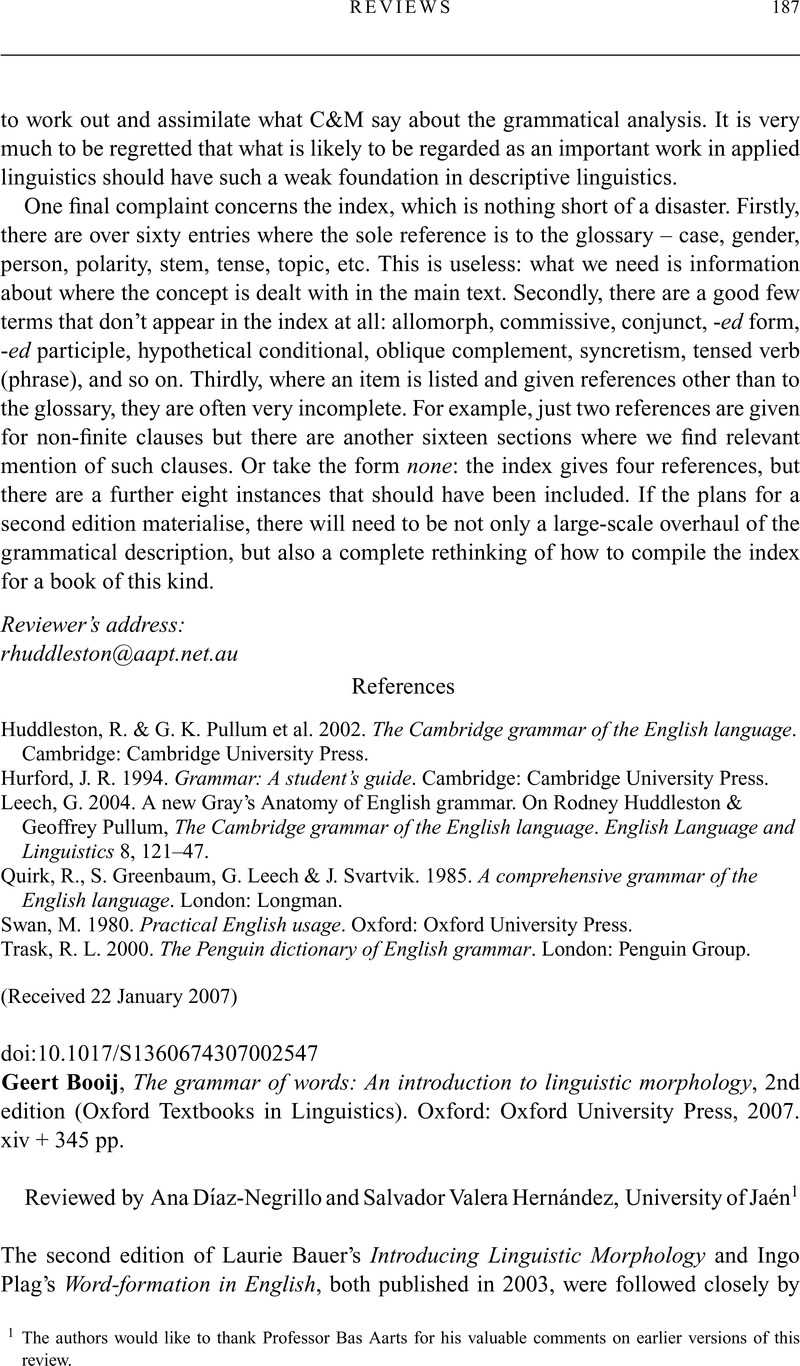No CrossRef data available.
Article contents
Geert Booij, The grammar of words: An introduction to linguistic morphology, 2nd edition (Oxford Textbooks in Linguistics). Oxford: Oxford University Press, 2007. xiv + 345 pp.
Published online by Cambridge University Press: 01 March 2008
Abstract
An abstract is not available for this content so a preview has been provided. Please use the Get access link above for information on how to access this content.

- Type
- Reviews
- Information
- Copyright
- Copyright © Cambridge University Press 2008
References
Adams, Valerie. 1973. An introduction to modern English word-formation (English Language Series 7). Harlow: Longman.Google Scholar
Aronoff, Mark & Fudeman, Kirsten. 2005. What is morphology? Malden, MA: Blackwell.Google ScholarPubMed
Bauer, Laurie. 1983. English word-formation. Cambridge: Cambridge University Press.CrossRefGoogle Scholar
Bauer, Laurie. 1998. When is a sequence of two nouns a compound in English? English Language and Linguistics 2, 65–86.CrossRefGoogle Scholar
Bauer, Laurie. 2003 [1988]. Introducing linguistic morphology, 2nd edition. Edinburgh: Edinburgh University Press.CrossRefGoogle Scholar
Booij, Geert, 2005. The grammar of words: An introduction to linguistic morphology (Oxford Textbooks in Linguistics). Oxford: Oxford University Press.Google Scholar
Bubeník, Vit. 1999. An introduction to the study of morphology (LINCOM Coursebooks in Linguistics 07). Munich: Lincom Europa.Google Scholar
Catford, J. C. 1988. A practical introduction to phonetics (Oxford Textbooks in Linguistics). Oxford: Clarendon Press.Google Scholar
Cruse, D. Alan. 2000. Meaning in language: An introduction to semantics and pragmatics (Oxford Textbooks in Linguistics). Oxford: Oxford University Press.Google Scholar
Giegerich, Heinz J. 1999. Lexical strata in English: Morphological causes, phonological effects (Cambridge Studies in Linguistics). Cambridge and New York: Cambridge University Press.CrossRefGoogle Scholar
Giegerich, Heinz J. 2004. Compound or phrase? English noun-plus-noun constructions and the stress criterion. English Language and Linguistics 8, 1–24.CrossRefGoogle Scholar
Goddard, Cliff. 1998. Semantic analysis: A practical introduction (Oxford Textbooks in Linguistics). Oxford: Oxford University Press.Google Scholar
Hohenhaus, Peter. 2005. Lexicalization and institutionalization. In Pavol, Štekauer & Lieber, Rochelle (eds.), Handbook of word-formation, 353–73. Dordrecht: Springer.CrossRefGoogle Scholar
Katamba, Francis. 2003. Morphology: Critical concepts in linguistics. London: Routledge.Google Scholar
Lipka, Leonhard. 1977. Lexikalisierung, Idiomatisierung und Hypostasierung als Probleme einer synchronischen Wortbildungslehre. In Brekle, Herbert E. & Kastovsky, Dieter (eds.), Perspektiven der Wortbildungsforschung: Beiträge zum Wuppertaler Wortbildungskolloquium vom 9.–10. Juli 1976. Anläßlich des 70. Geburtstags von Hans Marchand am 1. Oktober 1977, 155–64. Bonn: Bouvier.Google Scholar
Matthews, Peter H. 1991 [1974]. Morphology: An introduction to the theory of word-structure, 2nd edition. Cambridge: Cambridge University Press.CrossRefGoogle Scholar
Plag, Ingo. 2003. Word-formation in English (Cambridge Textbooks in Linguistics). Cambridge: Cambridge University Press.CrossRefGoogle Scholar


